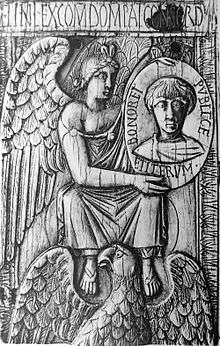Caecina Decius Maximus Basilius
Caecina Decius Maximus Basilius (floruit 483–500), was a Roman politician. He was the first consul appointed under Odoacer's rule (480), and afterwards was Praetorian prefect of Italy.[1] He is best known for presiding over the papal election of Pope Felix III.
Caecina Decius Maximus Basilius | |
|---|---|
 Detail of consular diptych depicting Basilius | |
| Consul of the Roman Empire | |
| In office 480 | |
| Preceded by | Flavius Zeno Augustus |
| Succeeded by | Rufius Achilius Maecius Placidus |
| Praetorian Prefect of Italy | |
| In office 483 | |
| Preceded by | Manlius Boethius |
| Succeeded by | Caecina Mavortius Basilius Decius |
| Personal details | |
| Died | 500 |
| Political party | Greens |
| Children | Albinus, Avienus, Inportunus, Theodorus |
| Father | Flavius Caecina Decius Basilius |
| Residence | Aventine Hill, Rome |
Life
A member of the gens Decia, Basilius was the son of Caecina Decius Basilius, one of the two consuls of 463. He had four sons, all of whom attained consular rank: Albinus in 493 (presumably the first consul nominated by Theodoric the Great), Avienus in 501, Theodorus in 505, and Inportunus in 509.[2] He was the first consul appointed from Rome since Rufius Postumius Festus eight years before.
As leader of the Roman Senate and chief minister to king Odoacer, and patron to the Greens, Basilius was one of the most powerful men in post-Imperial Rome.[3] As a result, Basilius played a major role in the papal election of 483, being the beneficiary of an admonitio issued by Pope Simplicius that gave him veto power over the election of Simplicius' successor. When it was clear Simplicius was on his deathbed, Basilius convened a meeting of the Roman Senate, the local clergy and leading local bishops at the Imperial Mausoleum to elect the next Pope, Felix.[3] At the same council, an ecclesiastical law was promulgated which forbade the alienation of ecclesiastical property by future popes.[4]
The proceedings of a Roman synod of 501 indicate that he was dead by that date, and a passage of Cassiodorus shows that his death occurred before his sons reached adulthood, leaving their mother in charge of running the household.[1]
References
- John Moorhead, "The Decii under Theoderic", Historia: Zeitschrift für Alte Geschichte, 33 (1984), p. 107
- Cassiodorus, Variae III.6.2; translated by S.J.B. Barnish, Cassiodorus: Variae (Liverpool: University press, 1992), p. 50
- Jeffrey Richards, The Popes and the Papacy in the Early Middle Ages (London: Routledge and Kegan Paul, 1979), p. 58
- Richards, Popes and the papacy, p. 59
| Political offices | ||
|---|---|---|
| Preceded by Imp. Caesar Flavius Zeno Augustus III (alone) |
Consul of the Roman Empire 480 |
Succeeded by Rufius Achilius Maecius Placidus (alone) |